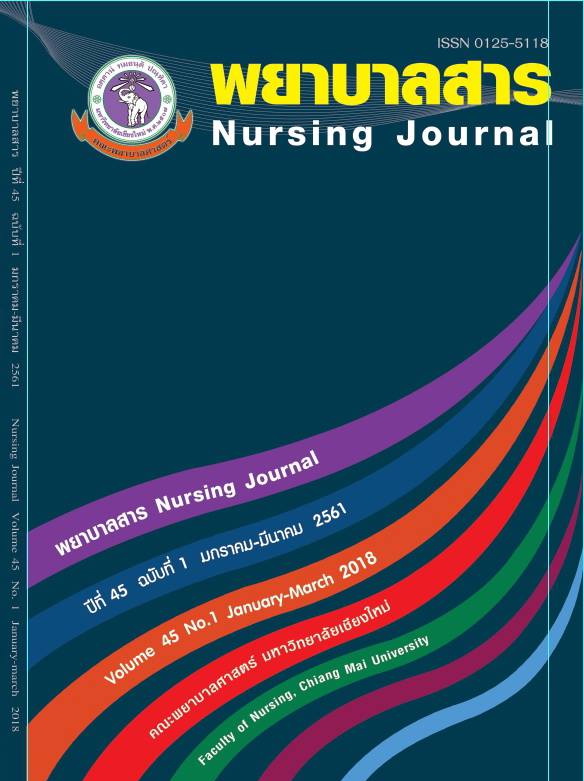Effects of supportive and educative nursing system program on Self-Care Behaviors and Blood Pressure Control among Hypertensive Patients.
Keywords:
supportive and educative nursing system program, self-care behaviors, blood pressure control, hypertensive patientsAbstract
Hypertension is a chronic disease. Nursing care using a supportive and educative system made the patients self-care behaviors and control of blood pressure.
This quasi-experimental research aimed to examine the effects of supportive and educative nursing system program on self-care behaviors, systolic and diastolic blood pressure level between control and experimental group at Mae Aep health promotion hospital in Chiang Rai province with the samples 54. They were randomly assigned to the experimental group (27 persons) and control groups (27 persons). The experimental group was encouraged to engage in supportive and educative nursing system program, which was developed based on the Orem concept. The control group received usual nursing care. The research instruments were self-care behaviors interview and a sphygmomanometer. The data were analyzed using descriptive statistics and t-test.
Finding indicated that after enrollment, the experimental group had significantly higher mean rank of self-care behavior than at baseline and the control group (p<0.001). The mean score of systolic and diastolic blood pressure in the experimental group was significantly lower than at baseline and in the control group (p<0.001 and p<0.05).
References
กนกวรรณ อุดมพิทยารัชต์. (2557). โปรแกรมสุขศึกษาโดยประยุกต์ทฤษฏีการรับรู้ความสามารถตนเองเพื่อส่งเสริมพฤติกรรมการออกกำลังกายของผู้ป่วยโรคความดันโลหิตสูงชนิดไม่ทราบสาเหตุ. วารสารวิชาการ Veridian E-Journal; 7(1).
จารุณี ปลายยอด อรสา พันธ์ภักดีและชีวรัตน์ ต่ายเกิด. (2555). ผลของโปรแกรมการส่งเสริมการมีส่วนร่วมใoการดูแลตนเองต่อการรับรู้ความสามารถในการดูแลตนเอง น้ำหนักตัว และการควบคุมความดันโลหิตของผู้ที่เป็นโรคความดันโลหิตสูง. รามาธิบดีพยาบาลสาร; 8(2), 223-236.
ประจวบ สุขสัมพันธ์ และประภา ลิ้มประสูตร. (2551).ผลของระบบการพยาบาลแบบสนับสนุนและให้ความรู้ต่อพฤติกรรมการดูแลตนเองของประชากรกลุ่มเสี่ยงโรคความดันโลหิตสูง. วารสารพยาบาลศาสตร์มหาวิทยาลัยนเรศวร; 2(ฉบับพิเศษ), 52-64.
พรพรรณ เทิดสุทธิรณภูมิ. (2558). ผลของการใช้โปรแกรมส่งเสริมการดูแลตนเองต่อพฤติกรรมการดูแลตนเองและคุณภาพชีวิตของผู้ป่วยภาวะหัวใจล้มเหลวโรงพยาบาลประจวบคีรีขันธ์. วารสารพยาบาลโรคหัวใจและทรวงอก; 26(1), 2-14.
Bureau of Non Communicable Diseases Department of Disease Control Ministry of Pubic Health. (2012).
Number and rate of patients with hypertension. Classified by service area. Retrieved
from: URL: http://thaincd.com/2016/mission3.
Burns, N., & Grove, S. K. (2005). The practice of nursing research. Philadelphia: Saunders.
Douglas, B. M. & Howard. E. P., (2015). Predictors of self-management behaviors in older adults with hypertension. Advances in Preventive Medicine; (2015), 6.
Findlow, J. W., Basalik, D. W., Dulin, M., Tapp H., & Kuhn, L. (2013) Preliminary validation of the hypertension self-care activity level effects(H-SCALE) and clinical blood pressure among patients with hypertension. The Journal of Clinical Hypertension; 15(9), 637-643.
Hu, H., Li, G., & Arao, T. (2013). Prevalence rates of self-care behaviors and related factors in a Rural hypertension population: A questionnaire survey. International Journal of Hypertension; (2013), 8.
James, P. A., Oparil, S., PharmD, B. L.C., Cushman, W.C., Himmelfarb, C. D., Handler, J. et al., (2014). Evidence-Based Guideline for the management of high blood pressure in adults report from the panel members appointed to the Eighth Joint National Committee (JNC 8). JAMA; 311(5), 507-520.
Joint Nation Committee. (2014). The eighth report of the joint nation committee on prevent,detection,evaluation and treatment of high blood pressure: The JCN 8 report. Journal of the American Medical Association. 289.
Khresheh, R. & Mohammed, N. (2016). Self-care behaviors among women with hypertension in Saudi Arabia. IOSR Journal of Nursing and Health Science; 5(3), 52-56.
Maklamdum P. (2015). The effect of health promotion on self-care behaviors for the elderly patients with hypertension. Phranakhon Rajabhat Research Journal; 10(1), 20-39. (in Thai)
Orem, D. E. (2001). Nursing: Concepts of practice (6th Ed). Saint Louis: Mosby.
World Health Organization. (2015). World Health Statistics 2015. Retrieved from http://www.who.int/gho/publications/world health statistics/2016/Annex B/en/.
Yang, S. O., Jeong, G. H., Kim, S. J. & Lee, S. H. (2014). Correlates of self-care behaviors among low-income elderly women with hypertension in south Korea. JOGNN; 43, 97-106.
Translated Thai Referance
Thatseng B., Lasuka D., & Khampolsiri T. (2012). Effects of a self-management supporting program on self- management behaviors and blood pressure among elders with hypertension. Nursing Journal; 39(4), 124-137. (in Thai)
Audompittayarat K. (2014). Health Education Program Applying Self-Efficacy Theory to Promote Exercise
Behavior in Essential Hypertensive Patients. Veridian E-Journal; 7(1).
Plaiyod J., Panpakdee O., & Taikerd C. (2012). Effects of a promoting self-care participation program on perceived self-care ability, body weight, and blood pressure control in persons with hypertension.; 8(2), 223-236. (in Thai)
Suksampan P., Limprasutr P., & Othaganont P. (2008). The effect of supportive educative nursing system on self- care behaviors of hypertensive risk group. Journal of Nursing Science Naresuan University;
2 (Supplement), 52-64. (in Thai)
Downloads
Published
How to Cite
Issue
Section
License
บทความที่ได้รับการตีพิมพ์เป็นลิขสิทธิ์ของวารสารพยาบาลสาร
ข้อความที่ปรากฏในบทความแต่ละเรื่องในวารสารวิชาการเล่มนี้เป็นความคิดเห็นส่วนตัวของผู้เขียนแต่ละท่านไม่เกี่ยวข้องกับมหาวิทยาลัยเชียงใหม่ และคณาจารย์ท่านอื่นๆในมหาวิทยาลัยฯ แต่อย่างใด ความรับผิดชอบองค์ประกอบทั้งหมดของบทความแต่ละเรื่องเป็นของผู้เขียนแต่ละท่าน หากมีความผิดพลาดใด ๆ ผู้เขียนแต่ละท่านจะรับผิดชอบบทความของตนเองแต่ผู้เดียว






